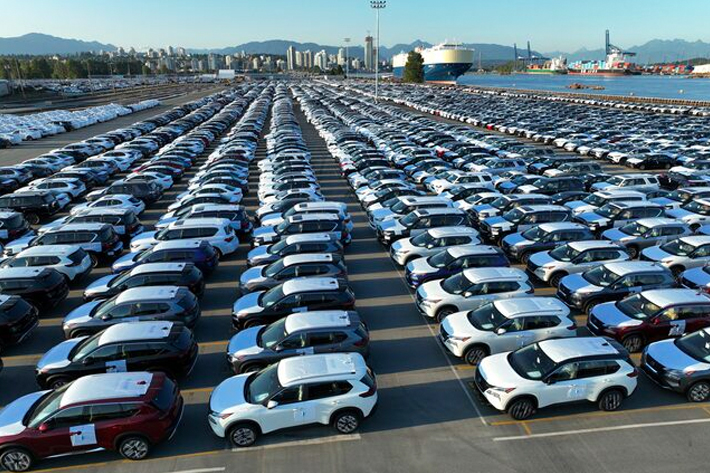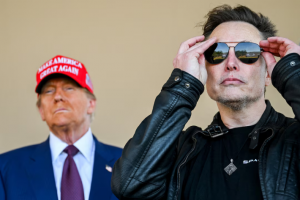Beijing on Tuesday accused Canada of adopting protectionist policies and violating World Trade Organisation (WTO) rules, following Ottawa’s decision to slap steep tariffs on Chinese electric vehicles, steel and aluminium.
Canada announced 100% tariffs on China-made EVs — including those made by Elon Musk-led Tesla — on Monday, adding that it was considering similar levies on chips and solar cells.
It also announced a 25% tariff on imported steel and aluminium from China. The new tariffs will come into effect starting October 1.
Also on AF: Many US Manufacturers Don’t Want Tariff Hikes on China Imports
Canadian Prime Minister Justin Trudeau said the move was meant to counter China’s intentional, state-directed policy of over-capacity.
“I think we all know that China is not playing by the same rules,” he told reporters.
In response, a Chinese commerce ministry spokesperson said Canada’s actions would “disrupt the stability of global industrial and supply chains” and also damage interests of businesses operating in the two countries.
“The Canadian side claims to support free trade and the multilateral trading system based on World Trade Organization rules, but it flagrantly violates WTO rules, blindly follows individual countries, and announces that it will adopt unilateral tariff measures, which is typical trade protectionism,” the spokesperson said in a statement.
Similar levies likely on chips
China is Canada’s second-largest trading partner, although it trails far behind the United States.
Canadian imports of automobiles from China to its largest port, Vancouver, jumped 460% year over year to 44,356 in 2023, when Tesla started shipping Shanghai-made EVs to Canada.
Canada is not, however, among the top 10 export destinations for Chinese steel and aluminium.
Canadian PM Trudeau said Ottawa will continue to work with the United States and other allies to combat China’s “non-market practices”.
Semiconductors and solar cells will also likely attract punitive tariffs as Canada moves in “alignment and in parallel with other economies around the world,” he added.
The United States and the European Union have both imposed heavy tariffs on a range of imports from China. But while the US has delayed their implementation, the EU recently softened its stance on the tariff rate slightly.
Manufacturers may shift export bases
Responding to concerns about the trade impact of the tariffs, a Canadian government official suggested firms were free to shift their production bases.
“It is a 100% surtax on all Chinese-made EVs. If companies currently making vehicles in China choose to move their production to a different country, they would no longer be captured by this tariff,” the official said.
Shares of US automaker Tesla took a beating on Monday, closing down by 3.2%, on the back of the tariff announcement. Tesla stock looked poised to open slightly lower again on Tuesday, as per pre-market trade.
Tesla does not disclose its Chinese exports to Canada. However, vehicle identification codes showed that the Model 3 compact sedan and Model Y crossover models were being exported from Shanghai to Canada.
“In response to the tariffs, I would expect Tesla would shift its logistics and potentially export autos to Canada from the US,” Seth Goldstein, an equity strategist at Morningstar, said.
“The market is likely reacting to the tariffs and weighing a potential profit impact if Tesla has to export vehicles to Canada from its higher-cost production base in the US,” Goldstein said referring to the drop in shares.
Canadian automakers, however, were jubilant.
“We feel vindicated and motivated. Let’s now get to the business of defending our market with the best of Canadian innovation and resolve,” Flavio Volpe, president of the Automotive Parts Manufacturers’ Association, said in a statement.
- Reuters, with additional editing by Vishakha Saxena
Also read:
US Tech Firms Face ‘Death Spiral’ From New China Curbs: Lawmakers
Double or Quadruple, Biden Tariffs Won’t Really Hurt China
Chinese Firms Seen Shifting Production Abroad to Avoid US Tariffs
China to Curb Exports of Antimony Metals, Ores, Oxides – SCMP
Excess Capacity Claim is Wrong, We’re More Competitive: China
EU’s Borrell Says Trade War With China is ‘Maybe Unavoidable’
In U-Turn, Elon Musk Says US Tariffs on Chinese EVs ‘Not Good’
Stellantis CEO Calls China EV Tariffs a ‘Trap’. He May Be Right























